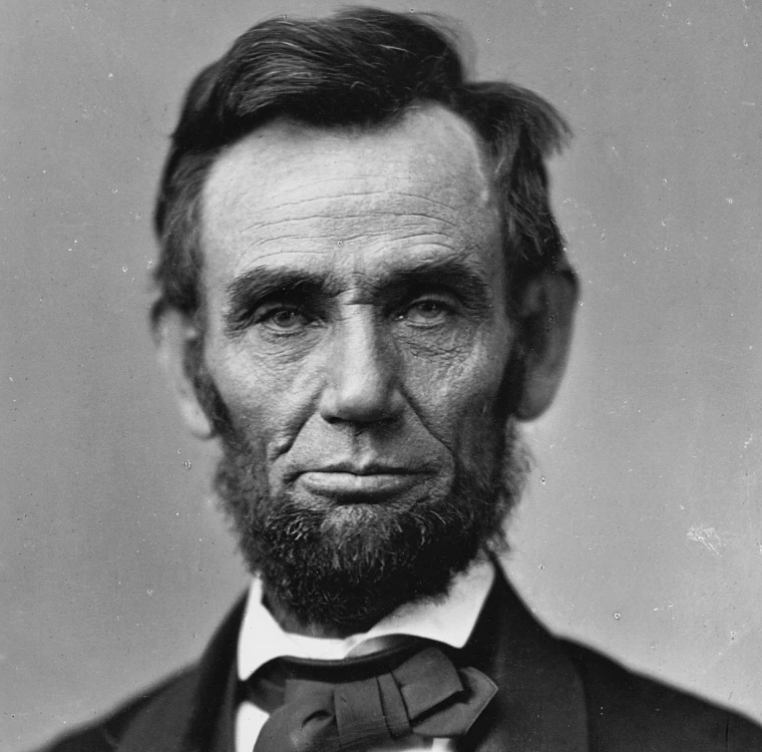President Abraham Lincoln served as the country’s 16th President, from 1861 through April 1865. Lincoln led the nation through the Civil War, preserved the Union and abolished slavery.
Early Life
Abraham Lincoln was born in February of 1809 in a log cabin in Kentucky. Thomas Lincoln, Abraham’s father, worked odd jobs as a farmer, cabinetmaker, and carpenter. Lincoln had very little formal education and was mostly self-educated. He learned to read around age seven and developed a life-long interest in reading.
In 1831, Lincoln left home and began working in a general store in New Salem, Illinois. In 1832, he declared his candidacy for the Illinois House of Representatives. However, he interrupted his campaign to serve as a captain in the Illinois Militia during the Black Hawk War. When Lincoln returned home, he purchased a general store. Over time, the business went into debt, and Lincoln sold it, and assumed the roles of postmaster and county surveyor for the town of New Salem. In 1834, Lincoln was successful in his second campaign for the Illinois House of Representatives. He joined as a Whig, becoming a strong proponent of the Illinois and Michigan Canal, and adopting a “free soil” stance opposing slavery and abolition.
Lincoln learned the law by borrowing books from lawyers and became admitted to the Illinois bar in 1836. Lincoln met his wife, Mary Todd Lincoln, in 1839. They settled in Springfield, Illinois, close to where Lincoln’s office was located. Lincoln practiced all types of law. During this time, he won the nickname “Honest Abe,” an ode to his legal reputation.
Political Life
In 1846, Lincoln won the election for Illinois’ 7th District seat in the U.S. House of Representatives. As a Whig, Lincoln was in favor of abolishing slavery in the District of Columbia, and the Wilmot Proviso, which was a failed proposal to ban slavery in any U.S. territory won from Mexico. The debate over slavery continued. Lincoln continued to declare his opposition to slavery and joined the Republican party in response to the demise of the Whig Party in 1855. He emerged as a Republican leader in Illinois during this period.
Lincoln ran for the U.S. Senate in 1858, hoping to defeat the incumbent Stephen Douglas. Douglas and Lincoln debated seven times over slavery during the course of the campaign. Lincoln lost the election, but the debates fueled Lincoln’s national popularity. He traveled across the Northeast trying to garner support. Lincoln won the Republican nomination in 1860, and he won the election for president in November 1860. Out of the fifteen southern states, there were zero ballots cast for Lincoln in ten of the states. Lincoln carried the free states, winning 39.8% of the votes in the four-way race.
The southern states were enraged by Lincoln’s election and began making plans for secession. South Carolina, Florida, Mississippi, Alabama, Georgia, Louisiana, and Texas left the Union by February of 1861, declaring themselves the Confederate States of America. In April of 1861, the Confederates fired the first shots at Fort Sumter, South Carolina, beginning the Civil War.
Lincoln responded the Civil War by assuming the role of Commander-in-Chief, using his war powers to fight on behalf of the Union. In June of 1862, Congress passed an act banning slavery on all federal territory. In September, Lincoln announced the preliminary Emancipation Proclamation, announcing that slaves would be freed in the states still in rebellion on January 1, 1863. Three million slaves were freed by Union armies. In November of 1863, Lincoln delivered the Gettysburg Address, dedicating the Gettysburg Battlefield cemetery to the proposition that all men are created equal.
In 1864, Lincoln ran for reelection. He selected Andrew Johnson as his running mate, in order to appeal to both the Republican and War Democrat parties. During Lincoln’s second term, he focused on reconstructing the Union. Lincoln implemented the Emancipation Proclamation, and pressured Congress to outlaw slavery through a Constitutional Amendment. The Thirteenth Amendment was added to the Constitution in December of 1865, outlawing slavery in the United States.
Lincoln was assassinated on April 14, 1865 by John Wilkes Booth. Lincoln and his wife attended the play, Our American Cousin, in Ford’s Theatre. Booth entered the back of Lincoln’s theater box and fired his gun at the back of Lincoln’s head. Lincoln died eight hours later, in the early morning of April 15. Over the course of three weeks, Lincoln’s body traveled on a funeral train, making stops between Washington, D.C., and Springfield, IL. Hundreds of thousands of people attended memorials for Lincoln, and he was ultimately laid to rest in Springfield, IL. President Lincoln is remembered as one of the highest-ranking presidents in United States history.






